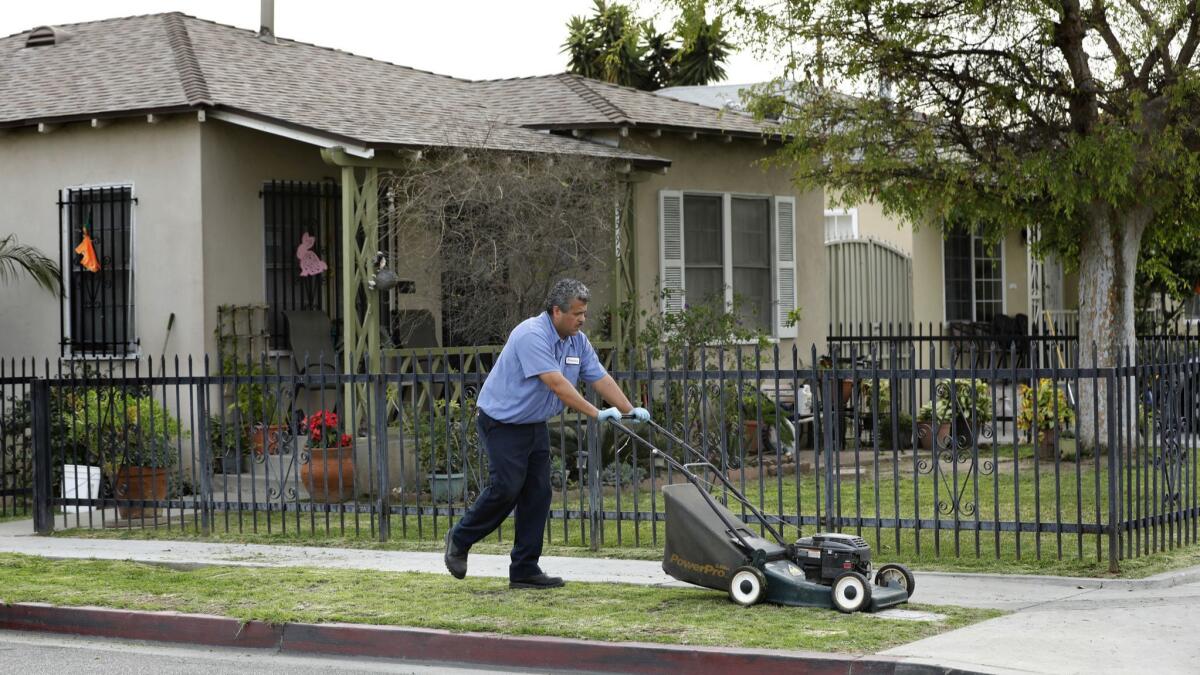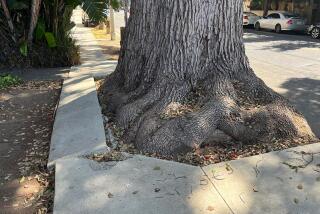Lawmakers seek $16 million to expand Exide lead cleanup beyond yards

A long-overlooked source of lead contamination in neighborhoods near a closed Vernon battery recycler could be cleaned under a push by state lawmakers to target the grassy strips between sidewalks and streets.
The publicly owned stretches of land, known as parkways, are not included in the state’s slow-moving cleanup of southeast L.A. County yards near the shuttered Exide Technologies facility.
But with a budget action approved by an Assembly committee Wednesday, state lawmakers seek to commit $16 million in funds for cleaning parkways. The money would come from existing fees on lead-acid car batteries like the ones that were melted down at the Exide plant.
If made law, it would raise the cost of the taxpayer-funded project to about $200 million but bring a more thorough cleanup to communities that have long suffered from health-damaging lead contamination that spewed from the facility.
“It’s a small step in the larger fight to get our communities cleaned up that have been neglected for now close to four decades on this issue,” said Assemblyman Miguel Santiago (D-Los Angeles).
The Department of Toxic Substances Control’s plan to clean the 2,500 worst-contaminated residential parcels, schools, child care centers and parks in the zone of 10,000 properties near the facility has been criticized by community groups and health officials as piecemeal, leaving a checkerboard-like pattern of safe and contaminated land extending more than 1.7 miles from the closed plant.
A department spokeswoman said, “We are not able to comment on pending legislation.” Previously, officials said they have conducted no soil testing of the parkways and will not be cleaning them.
Residents have pushed for more health-protective measures, including the remediation of parkways, without which they fear dangerous levels of lead will remain in the soil next to homes. The state’s plan leaves those areas untouched, saying they pose lower health risks to children than adjacent yards.
Meanwhile, work on the project has been going so slowly that the $176.6 million lawmakers set aside two years ago to test and remediate the soil of thousands of properties is set to expire next month, with most of it unspent and fewer than 275 residential properties and day-care facilities cleaned.
Under the proposal, lawmakers who have criticized the glacial pace of cleanup and other deficiencies would also grant the request of Gov. Jerry Brown’s administration to extend funding for the project by three years to 2021.
The money for parkway remediation would come from the state’s new Lead-Acid Battery Cleanup Fund, established through 2016 legislation and earmarked for the investigation and cleanup of sites contaminated by battery recycling facilities, including the former Exide plant in Vernon.
The Brown administration had sought to use money from that fund for other programs, including consumer product rules and enforcement initiatives unrelated to the cleanup of lead-acid battery pollution. Last week that request encountered opposition from legislators who questioned whether the law allows battery cleanup funds to be used for those purposes.
Regulators’ stance on parkway cleanup has vexed residents such as Francisco Cruz, a truck driver whose family’s home on 53rd Street in Maywood was cleaned of lead-contaminated soil in an earlier phase of the project.
More than three years later, he remains disappointed it did not include parkways, which he mows and tends as if they were part of his yard.
“It’s ridiculous to think the other side isn’t contaminated,” he said recently in Spanish, standing on the sidewalk and pointing to his yard on one side and the parkway on the other. “It’s still contaminated.”
Jill Johnston, a professor of preventive medicine at USC, said her team took multiple soil samples from homes and typically found higher levels of lead in the surface soil of the parkways compared to the yards. Because of the proximity of those strips of land to vehicle traffic, they believe at least some of that pollution is a legacy of decades-old vehicle exhaust before lead was phased out of gasoline.
Department of Toxic Substances Control Director Barbara Lee told lawmakers recently that cleaning the parkways would increase the project’s price tag by 10% or more, writing in a letter Monday to Assemblywoman Wendy Carrillo (D-Los Angeles) that it would cost an estimated $16 million to sample and clean parkways “associated with residential areas prioritized for cleanup.”
At a budget hearing last week, Lee attributed the decision not to clean them to a “finite amount of resources” and a department analysis that showed a lower risk of lead exposure to children in those areas.
Limited funds would best be used cleaning play areas in yards “rather than the planted areas along the roadways, where young children don’t generally spend extensive amounts of time playing in the dirt,” Lee told lawmakers.
Los Angeles city and county officials were among those who had disputed the notion that parkways are not high risk. At one home where city officials worked recently, a child’s lead poisoning was traced to a dog that was tracking in contaminated soil from a nearby parkway.
Though additional funds and other steps are needed to strengthen the project, including parkways would mean “a more thorough cleanup in the neighborhoods,” said Jane Williams, who directs California Communities Against Toxics.
State regulators have defended their approach as targeting areas where lead contamination poses the greatest risk. They blame cleanup delays on environmental requirements, the large scope of the project and a major cleanup contract that fell through this year. They’ve pointed to a smaller contract, signed last month to clean 215 of the highest-risk properties, as evidence that the project is moving ahead.
Assembly members also said Wednesday that they would hold an oversight hearing in August to gauge progress on the Exide project.
“We are all understandably frustrated with cleanup delays,” Carrillo said, “but we must also ensure that the cleanup is comprehensive.”
UPDATES:
May 23, 3:15 p.m.: This article was updated to include mention of a planned oversight hearing and additional comment from lawmakers.
May 23, 11:05 a.m.: This article was updated after an Assembly committee approved the Exide budget action.
This story was originally published May 22, 7:10 p.m.
More to Read
Sign up for Essential California
The most important California stories and recommendations in your inbox every morning.
You may occasionally receive promotional content from the Los Angeles Times.











